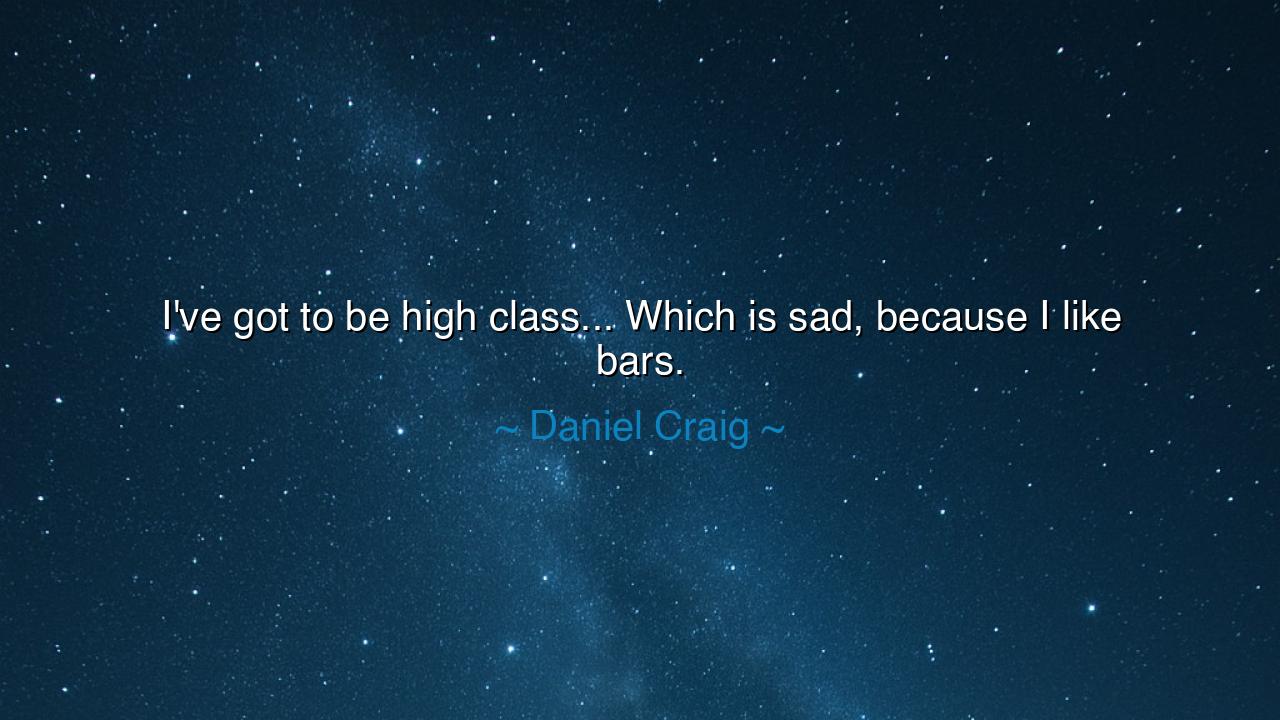
I've got to be high class... Which is sad, because I like bars.






The words of Daniel Craig, “I’ve got to be high class… Which is sad, because I like bars,” seem playful at first, almost a throwaway remark, yet they conceal a truth as old as fame itself—the sorrow of distance between who one is and who one is expected to be. Beneath the humor lies the lament of a man who has climbed to a height where simplicity is no longer permitted. Craig, forever linked to the image of James Bond, the epitome of sophistication and control, speaks here not as an actor of luxury, but as a human being caught between two worlds—the world of image and the world of authenticity. His words echo with the ancient ache of identity sacrificed at the altar of success.
In the modern tongue, this may sound like irony, but in the language of the ancients, it is the tragedy of appearance versus essence. Many who rise to greatness must adopt masks that no longer reflect the faces beneath them. They become symbols rather than men. Craig’s “high class” is not a virtue he has chosen, but a burden imposed upon him by fame’s illusion—the world now expects him to move through life like the very character he portrays: elegant, untouchable, immaculate. Yet in truth, he yearns for the warmth of ordinary pleasures, for the ease of the bar, the laughter of common people, the comfort of anonymity. His sadness is not in refinement itself, but in the loss of freedom to be imperfect, human, and spontaneous.
The ancients would have understood this conflict well. Marcus Aurelius, emperor of Rome, wrote in his meditations that “a man should not be made into the thing that others imagine him to be.” Though he ruled the mightiest empire, Marcus longed for simplicity, for the quiet of philosophy, for the companionship of those who saw the man beneath the crown. Like Daniel Craig, he was trapped in an image that the world demanded, an image that denied him the intimacy of the ordinary. The higher a man ascends, the more the world ceases to see him as flesh and blood—and the lonelier he becomes within his own greatness.
There is also within Craig’s words a reminder of the fragile humanity of fame. The modern world, with its bright lights and illusions of glamour, worships perfection and sells it as truth. But the wise know that all grandeur is a costume, and every public persona conceals a private longing. The “high class” life may gleam with privilege, but it often steals the warmth of belonging. To “like bars,” as Craig confesses, is not mere fondness for drink—it is a yearning for connection, for the simple communion that fame forbids. In the bar, everyone is equal; no one wears armor. There, the great and the humble stand side by side, stripped of title, speaking freely. What he mourns is not the bar itself, but the freedom of being unguarded.
Such is the paradox of all who achieve greatness: the world gives them everything but takes from them the small things that once gave life meaning. This is why Diogenes, the philosopher who lived in a barrel, rejected wealth and convention, choosing instead a life of radical simplicity. When Alexander the Great offered him any gift he desired, Diogenes replied, “Stand out of my sunlight.” In that moment, he revealed a truth that echoes through Craig’s lament: the higher the pedestal, the further one stands from the sun. To be “high class” is to live among the clouds—beautiful, but far from the warmth of the earth.
Yet Craig’s words do not reek of bitterness; they carry the dry humor of acceptance. He knows the price of his craft, and he pays it with grace. To say “it’s sad” is to acknowledge the cost of transformation—to admit that every gain carries loss. This humility redeems the statement, for it is not complaint but awareness. He recognizes that fame, like a fine suit, must be worn, but it need not define the man within it. And in that awareness lies wisdom: the ability to live within contradiction without losing the self.
So let this teaching be passed down: seek greatness, but guard your simplicity. Rise high, but do not forget the ground that steadies your feet. If the world demands that you play a role, play it well, but remember to return, when you can, to the places where your laughter is unmeasured and your soul unmasked. For there is no shame in longing for the ordinary—it is there, in the humble corners of life, that we rediscover our truest selves. As Daniel Craig reminds us, even the man in the finest suit still dreams of the warmth of the bar—the place where one may, for a moment, stop performing and simply be human.






AAdministratorAdministrator
Welcome, honored guests. Please leave a comment, we will respond soon